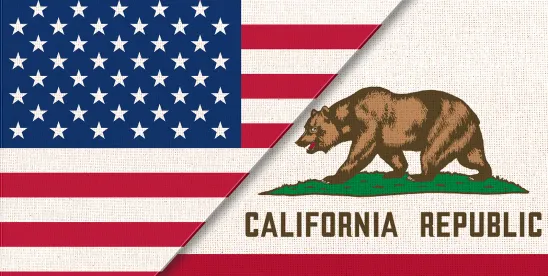California’s busy legislative year has come to an end, with Governor Gavin Newsom signing several new laws that will impact Golden State employers. Here, we summarize the laws expected to have the greatest impact on California employers in 2025.
Unless otherwise noted below, these new laws take effect January 1, 2025.
SB 1137: Protected Characteristics: Intersectionality
On September 27, 2024, Governor Newsom signed SB 1137, making California the first state to explicitly adopt the concept of intersectionality into its anti-discrimination law. Specifically, SB 1137 clarifies that the California Fair Employment and Housing Act (“FEHA”), among other laws, prohibits discrimination not just on the basis of individual protected traits, but also on the basis of the intersectionality of two or more protected traits. In particular, the amended law clarifies that the protected characteristics enumerated in the statute include a combination of those characteristics. The Legislature defines intersectionality as “an analytical framework that sets forth that different forms of inequality operate together, exacerbate each other, and can result in amplified forms of prejudice and harm.” Further, the Legislature recognized:
[W]here two or more bases for discrimination or harassment exist, they cannot be neatly reduced to distinct components. The attempt to bisect a person’s identity at the combination of multiple protected characteristics often distorts or ignores the particular nature of their experiences. When a person claims multiple bases for discrimination or harassment, it may be necessary to determine whether the discrimination or harassment occurred on the basis of a combination of those factors, not just based on any one protected characteristic by itself.
Notably, the U.S. Equal Employment Opportunity Commission’s interpretive guidance of Title VII of the Civil Rights Act of 1964 already recognizes similar protection relating to discrimination and harassment.
SB399– “Captive Meetings” Ban
Also signed on September 27, 2024, SB 399 prohibits an employer from subjecting or threatening to subject an employee to an adverse employment action because the employee declines to attend an employer-sponsored mandatory meeting discussing an employer’s opinion about religious or political matters, which include union and anti-union discussions. This bill also requires an employer to continue to pay an employee who refuses to attend such a meeting and imposes a civil penalty of $500 per employee for each violation. We discussed SB399 in a prior blog post.
In enacting SB 399, California joins a growing number of states that have enacted captive audience meeting bans in the last few years. For example, Connecticut, Maine, Minnesota, New York, and Oregon each have similar captive audience bans on the books. Most recently, Washington, Illinois, and Vermont passed laws in 2024. With that said, opponents of captive audience laws have raised concerns that these bans impede employer free speech rights and are preempted by the National Labor Relations Act. We will be closely following these challenges and will provide updates as they arise, but for now, California employers should consult with their counsel to ensure compliance with this new law. In addition, they should consider updating company policies and training supervisors about the limits pertaining to such meetings. If employers wish to hold meetings that may be construed as violating this law, they should emphasize the voluntary nature of the meeting and consider having employees formally acknowledge the same.
SB 1100 – Discrimination: Driver’s License
On September 28, 2024, Governor Newsom signed Senate Bill 1100, which makes it unlawful for an employer to include a statement in various employment materials that an applicant must have a driver’s license unless the employer reasonably expects the duties of the position to require driving and the employer reasonably believes that satisfying that job function using an alternative form of transportation, such as walking, biking, carpooling, or using a taxi or ride sharing service would not be comparable in travel time or cost to the employer.
Employers should review their job requirements and postings to ensure they do not run afoul of this new law.
AB 2499: Time Off for Victims of Violence
On September 29, 2024, Governor Newsom signed AB 2499, amending California laws prohibiting discrimination on the basis of an employee’s status as a victim of crime or abuse, as a member of a jury, or as a person convicted of certain crimes. Specifically, AB 2499 makes the following changes to existing law:
- Revises and recasts the jury, court, and victim time off provisions for employees as unlawful employment practices within the FEHA and, thus, within the enforcement authority of the California Civil Rights Department.
- Revises existing definitions for its purposes, including defining “victim” as an individual against whom a qualifying act of violence is committed.
- Defines a “qualifying act of violence” as domestic violence, sexual assault, stalking, and acts, conduct or patterns of conduct that include any of the following:
- An individual causing bodily injury or death to another individual.
- An individual exhibiting, drawing, brandishing or using a firearm or other dangerous weapon with respect to another individual.
- An individual using or making a reasonably perceived or actual threat to use force against another individual to cause physical injury or death.
- Prohibits an employer with 25 or more employees from discharging or in any manner discriminating or retaliating against an employee who is a victim or who has a family member who is a victim for taking time off work for any of a number of identified purposes relating to a qualifying act of violence.
- Permits an employer to limit the total leave taken pursuant to these provisions, as specified, and require that leave taken by an employee pursuant to these provisions run concurrently with leave taken pursuant to the federal Family and Medical Leave Act of 1993 and the California Family Rights Act if the employee would have been eligible for that leave.
- Expands the eligibility for reasonable accommodations to include an employee who is a victim or whose family member is a victim of a qualifying act of violence for the safety of the employee while at work.
- Omits the reinstatement and reimbursement provisions included in existing law.
- Requires an employer to inform each employee of their rights under the law, to be provided to new employees upon hire, to all employees annually, at any time upon request, and any time an employee informs an employer that the employee or the employee’s family member is a victim.
- Requires the California Civil Rights Department to develop and post, on or before July 1, 2025, a form that an employer may use to comply with the law’s posting notice requirement and makes a number of conforming changes to implement these provisions.
- Expands the paid sick leave requirement under the Healthy Workplaces, Healthy Families Act of 2014 to include the additional purposes for which the law would prohibit an employer from discharging, or in any manner discriminating or retaliating against, the employee, as specified.
We encourage California employers to review and update their leave policies to ensure compliance with these amendments.
AB 2123 – Amendments to Paid Family Leave
On September 29, 2024, Governor Newsom signed a significant change to the state’s Paid Family Leave (PFL) program. Chief among the changes for employers is the elimination of an employers’ ability to require employees to use up to two weeks of vacation time before accessing PFL benefits.
Under the previous PFL framework, employers could require employees to use their earned vacation time before tapping into state-provided PFL benefits. This practice has allowed employers to manage extended absences and potentially reduce the state’s benefit payout period. However, AB 2123 removes this option.
Although this change may seem like a loss for employers, businesses now may have more leeway in how they structure their leave policies and manage benefit contributions during employee absences. For instance, employers can encourage employees to use vacation pay to “top off” their PFL benefits, potentially simplifying the process of collecting employee contributions for ongoing benefits like health insurance.
As the implementation date approaches, it is critical for employers to review and potentially revise their leave policies, PTO structures, and benefit contribution processes to align with the amendments and maximize any potential advantages that may now be available.
SB 988 – “Freelance Worker Protection Act”
On September 28, 2024, Governor Newsom signed the “Freelance Worker Protection Act” (FWPA). This legislation significantly expands the obligations of businesses that engage independent contractors in California.
The FWPA applies to a wide range of professional services, including but not limited to marketing, graphic design, writing, and photography. It covers contracts valued at $250 or more, either individually or when aggregated over a 120-day period. This broad scope means that many businesses, regardless of size or industry, will likely be affected if they regularly engage freelancers or independent contractors.
One of the most important requirements for businesses under the FWPA is the mandate for written contracts. Contracts now must include specific details such as the scope of work, compensation, and payment terms. Businesses must provide a signed copy to the freelancer and retain their own copy for at least four years. Failure to provide a written contract for the contractor’s services can result in an additional $1,000 penalty if the business violates the FWPA by failing to pay the contractor.
The FWPA also imposes strict payment terms. Businesses must pay freelancers according to the timeline specified in the contract or, if no date is specified, within 30 days of completion of the contractor’s services. Failure to comply with these payment terms can result in significant penalties, including damages of up to twice the unpaid amount as well as payment of the contractor’s attorney’s fees. Additionally, the FWPA prohibits businesses from retaliating against freelancers who assert their rights under this law, adding another layer of compliance for hiring businesses to consider.
To prepare for the FWPA’s implementation, businesses should take several proactive steps. These include reviewing and updating existing freelancer agreements, training hiring managers and accounts payable staff on the new requirements, and potentially updating internal systems to ensure timely payments and proper record-keeping.
AB 2299 – Whistleblower Protections Posting
On July 15, 2024, Governor Newsom signed AB 2299, which requires the California Labor Commissioner develop a standardized, model list of employees’ rights and responsibilities under whistleblower laws. This list will be available on the Labor Commissioner’s website for employers to post. Employers will be required to ensure the list is posted in lettering larger than 14-point type. This new law does not however add to or change existing whistleblower protections.
Stay tuned for the release of the model list, and make sure to update your workplace postings accordingly.
Los Angeles, County Imposes Significant Restrictions on Criminal Background Checks
Although not a state-wide law, Los Angeles County’s new ordinance, the Fair Chance Ordinance for Employers (“FCOE”), which went into effect September 3, 2024, contains significant requirements and restrictions for Los Angeles County employers that want to perform criminal history checks on applicants. The ordinance only applies to employers with five or more employees whose place of work is within unincorporated parts of Los Angeles County. Remote workers residing within unincorporated parts of Los Angeles County are also covered by this ordinance. Although there are some exceptions for positions where background checks are required by law, the ordinance will impact a wide range of businesses and industries.
The FCOE prohibits covered employers from asking about an applicant’s criminal history prior to extending a conditional offer of employment. Although the FCOE covers much of the same ground that California’s state-wide Fair Chance Act covers, it is more stringent in a few ways. For example, it requires an employer to conduct a two-step assessment process, which must be done in writing, to take adverse action based on criminal history. Specifically, the first step, the Initial Individualized Assessment, must occur after a conditional job offer and receipt of the applicant’s criminal history. In this assessment, the employer must evaluate whether the applicant’s criminal history directly, adversely, and negatively impacts the applicant’s ability to perform the required job duties. Factors to consider include the nature and gravity of the offense, the passage of time since the offense or sentence completion, the nature of the job, and any voluntarily provided evidence of rehabilitation. If the employer intends to take adverse action based on the Initial Individualized Assessment, it must provide a Preliminary Notice of Adverse Action to the applicant. The applicant then has at least five business days (with a potential extension to 10 days) to respond with additional information or evidence. This leads to the second step: the Second Individualized Assessment. In this phase, the employer must reconsider their decision in light of any new information provided by the applicant. This assessment considers all factors from the Initial Individualized Assessment, plus any evidence challenging the accuracy of the criminal history report, additional evidence of rehabilitation or mitigating circumstances, and any other relevant information or explanation from the applicant. Like the Initial Individualized Assessment, this must also be documented in writing. This ordinance also prohibits consideration of a broader range of criminal history (including non-felony marijuana convictions over two years old and most convictions over seven years old). The county ordinance also imposes stricter penalties for violations, with fines up to $20,000 per aggrieved applicant for employers who are repeat offenders. It additionally requires employers to retain hiring records for four years and includes a rebuttable presumption of retaliation if adverse action is taken within 90 days of an applicant exercising their rights under the ordinance.
Employers with employees in unincorporated Los Angeles County should prepare in the following ways to ensure compliance with the FCOE:
- Review and update hiring practices, job applications, and interview procedures.
- Develop processes for conducting individualized assessments.
- Create templates for required notices to applicants.
- Train hiring managers and HR staff on the new requirements.
- Establish record-keeping systems to maintain compliance documentation.






 />i
/>i
